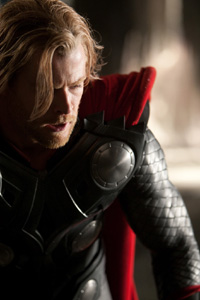 I’ve been so excited to share this with you.
I’ve been so excited to share this with you.
I know the response to the Thor footage and photos has been a mixed one, veering from wildly enthusiastic to negative. That’s to be expected. It’s a comic book property, and an iconic character fans are heavily invested in.
When the chance to have a chat with Thor screenwriter Don Payne came up at long past, I was eager to put some of those concerns to him. He was as honest as he could be without spoiling story elements, and I think what he reveals here is enough to wind up a lot of fans. There’s clearly been a lot of care and effort put into Thor, and that’s not something you can say about a lot of comic adaptations.
And I promise, I’ll arrange something post-Thor to talk more about what was or wasn’t in the movie … and what might be coming up.
———-
Thor has seen a lot of screenwriters come and go, and I imagine that led to some very drastic changes to the character and story. Can you talk at all about that process, and what changes were made over the course of project? (For example, I know rumors swirled very early that the Thor movie would be an origin story with his alter ego, Dr. Donald Blake!) How did the script come together? At what point in the process did you come on board, and what was your contribution?
First off, for the record, the final, official WGA writing credits for the film are “Story by J. Michael Straczynski and Mark Protosevich, Screenplay by Ashley Edward Miller & Zack Stentz and Don Payne.” Any other writing credits you might have seen elsewhere are either outdated or incorrect.
As far as how the script came together, J. Michael Straczynski and Mark Protosevich worked on the project before Kenneth Branagh came on board to direct. At that point, Ken and Marvel sat down and decided exactly what kind of story they wanted to tell. They took everything that had been written so far and figured out a game plan. Marvel then hired Ashley Miller and Zack Stentz, and, as I understand it, those guys worked pretty intensely on the screenplay over the course of four or five months. After they left the project, Marvel hired me, and I stayed on all the way through the end — about a year and a half total. For the first eight months, I continued to develop, rewrite, and restructure the screenplay, bringing in new characters and new scenes. I worked closely with Ken and Marvel throughout the process, and, as the cast came together, I worked with Ken and the actors during rehearsals here and in London.
Then, once production started in January 2010, I was on set writing every day, both at the studio in Manhattan Beach and on location in New Mexico, and continued to work through post-production.
I’d like to say more about how the script has evolved since the very beginning of the development process, but I don’t want to spoil anything. I hate spoilers. (Mostly because I’m weak, and I can’t resist them myself!) But I’ll be happy to talk about it all after the film comes out. What I can say is that this really has been the greatest writing experience of my life. I’ve never worked harder or been as closely involved day-to-day on a project as I have on Thor.
And as far as Thor’s alter-ego goes, as Kevin Feige has said, people looking for a Donald Blake reference might just find one.
I know you’ve worked with iconic superheroes before, was Thor more or less daunting to deal with? He’s a real anachronistic, medieval character. How do you bring that into the modern world? Is it ultimately the same as trying to make any superhero realistic and relatable?
Well, I think the challenges are pretty apparent. As you say, Thor’s a unique character, and it’s an unusual story we’re telling. When you’ve got something like Captain America, the premise is easier to get right away — he’s a superhero fighting Nazis in World War II. Whereas we’ve got an extra-dimensional being once worshipped as a god by the ancient Norse who’s banished to earth and stripped of his powers to learn humility, all set amidst the Shakespearean intrigue of a dysfunctional royal family. It’s not as simple to grasp.
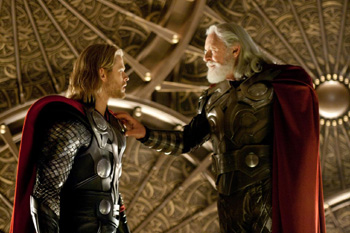 You just have to find the things that make Thor timeless and relatable as a character. It certainly helps that he’s charismatic and likeable, albeit flawed. He’s banished for good reason, but I think people will want to go on the journey with him and root for him to find redemption — particularly with Chris Hemsworth’s performance.
You just have to find the things that make Thor timeless and relatable as a character. It certainly helps that he’s charismatic and likeable, albeit flawed. He’s banished for good reason, but I think people will want to go on the journey with him and root for him to find redemption — particularly with Chris Hemsworth’s performance.
I think what really makes Thor relatable are the family relationships. There’s a lot of dysfunction in the House of Odin. Thor’s got a hard-ass father and a jealous brother. But for all of Thor’s hardheaded rebelliousness, he, like Loki, is really just trying to live up to his father’s expectations and make him proud. I think people can relate to that father and son dynamic.
Whenever I talk to anyone involved with Marvel movies, there seems to be a lot of excitement and enthusiasm. Can you talk about the difference in working with them and characters they’ve kept in-house, versus working with other franchises and their home studios?
It’s definitely a great thing to work with the guys at Marvel, like Kevin Feige and Craig Kyle. You never have to worry about fighting to protect the integrity of the characters or being true to the source material, because you’re all on the same page. They’re fans, you’re a fan, and you really feel like you’re all working towards the same goal.
What’s also been great about Thor is that it’s not a sequel. It’s the first one out of the gate. When you come on board a sequel, most of the elements have been set up in the first film, so you’re already dealing with constraints in storytelling. The interpretations of the characters have been established, the tone of the franchise has been set up, etc. With Thor, it’s all new, and it’s exciting to be a part of that.
How did the development and announcement of The Avengers affect the eventual script? Were there incarnations that strictly dealt with Thor, and didn’t offer any kind of tie-in? How difficult was it to keep the eventual Marvel cinematic universe in mind, and still tell a solo story?
Ken and Marvel have always been adamant about making this a self-contained Thor story. It’s set in the larger Marvel Cinematic Universe, sure, and it’s always fun to drop in Easter eggs. But this is Thor’s standalone movie. I think that’s a wise decision. Keeping that in mind, it wasn’t too difficult to make sure that whatever links or set-up to The Avengers we included didn’t diminish or interfere with the story.
Fans are still surprised by Kenneth Branagh being the director of Thor. What was it like working with him? What did he bring to the script and the character? Is he a secret geek with a basement of comic books?
I can’t confirm that he has a basement full of comic books — and “geek” isn’t a word I’d ever use to describe him — but I do know he has always been a big fan of Thor, starting back from when he was just a kid in Ireland. He knows the character extremely well, he knows the big themes of the Thor universe, and he’s got the vision to bring it all to the screen in the most dynamic way possible.
When I first went in to meet on the project, I told Ken and the Marvel guys that the thing I liked most about what they were trying to do was that, at its core, this was really a story about fathers and sons. I found out later that this is what Ken had been saying since he was first involved on the project.
From that very first meeting, I was amazed by how down-to-earth he was for a director and actor of his status. I was also struck by his sense of humor and his passion for the project. He’s very smart, focused, and precise, with a seemingly endless reserve of energy during production. But what I was most impressed with is the way he treats every member of the crew with the same respect, and how he always seems to maintain his calm, even under the most difficult circumstances. I think Tom Hiddleston once referred to him as a “benevolent field marshal,” and I think that’s an apt description of his directing style.
He also believes strongly in collaboration. He’s firmly in charge, but he listens to other people’s views. The whole process has benefited from him encouraging and valuing input from the actors, the studio, the VFX team, etc. Some directors don’t have the self-confidence to do that. They’re the same ones who don’t have writers on the set. They’re too insecure. They feel threatened by the writer’s presence, or they fear it may be confusing to the actors. It’s always struck me as odd. You have specialists on the set for hair, make-up, lighting, etc. — ready if a problem arises — so why wouldn’t you have someone on the set for something as important as the words? But Ken’s not like that. And while he and the rest of us were all striving for the lofty goals of Shakespearean themes and complex character relationships, Ken kept reminding us not to lose sight of the fact that we really want this to be a fun Saturday night at the movies.
Are there any Thor comic runs in particular that influenced your take on the character, and the movie’s story? Are there any you would recommend to fans to prepare them for the movie?
I love the original Stan Lee/Jack Kirby/Larry Leiber stuff. I just bought the new Thor Omnibus Volume 1. It’s great, because it’s got Journey Into Mystery #83-120, all in color, all in one hardcover volume. It’s been fun revisiting those old stories.
Of course, Walt Simonson’s run is amazing, with the Surtur saga, Beta Ray Bill, and everything he did with Balder. I also really enjoyed Matt Fraction’s Ages of Thunder, Reign of Blood, and Man of War.
I actually met J. Michael Straczynski the day he filmed his cameo. That was fun, because I’m a big fan of his work. It’s no secret that there are elements in the movie which are inspired by his recent run on the Thor comic, which I love. In fact, I had the opportunity to meet all of the previous writers on the film. Marvel was nice enough to give each of them a chance to visit the set. Since I was there working on set every day, I got to meet them the day each one of them stopped by. That rarely happens on a movie — writers meeting other writers who worked on the same project. They all seem like very decent guys. I actually missed Ashley Miller the day he came by, but I’d had a pleasant phone conversation with him previously.
A lot of the sets and costumes have a real Nordic / Anglo-Saxon flavor. I know Marvel’s Asgard is a distinctly alien place, but did you look to any Nordic mythology for inspiration? At one point in the trailer, when Thor is explaining magic to Jane, it looks like Thor is actually drawing a version of Yggdrasil. Are there little touches like that you tried to work in for fans, and for yourself?
The sets and costumes look amazing on the big screen. That’s thanks to the brilliant work of the crew, particularly our production designer Bo Welch and our costume designer Alexandra Byrne. I know they pulled from both the comics and from ancient Norse mythology for inspiration. As far as little touches for fans — yes, I’m hoping they’ll notice them throughout the film! 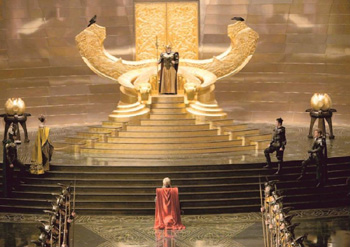
I know you probably can’t reveal any major plot details, but what can you tell us about the scope of the movie? Can you tell us how much takes place in Asgard, and how much takes place on Earth?
The film is still being tweaked, even as we speak. But I’d guess that a little over 50% of the action takes place in Asgard and Jotunheim, and the rest takes place on earth.
What can you tell me about the parts popular Asgardians such as Heimdall, the Warriors Three, and Sif play in the overall plot? Will we see more of them in other Marvel movies? Is there potential for a Sif spinoff, as she has enjoyed in the comics?
The Warriors Three and Sif are very much like they are in the comics. They’re fierce warriors who are fiercely dedicated to their friend Thor. They’ll follow him anywhere — which might not always be the wisest thing. Also, as in the comics, Heimdall is bound by duty and honor to guard his post on the Rainbow Bridge, and he’s got serious issues with anyone who tries to cross it who would endanger Asgard.
As far as seeing these characters in other movies or their own spin-off films, I think Marvel already has a full slate of projects in development, so I imagine we’ll only see them as part of the Thor franchise. But you never know. I’d ask Kevin Feige if I were you!
One constant complaint I’m hearing from fans is that the Thor movie looks “small” in comparison to Iron Man. They don’t feel the location or the action is sweeping enough based on the trailer. How would you answer that, and reassure them?
I’d tell them that they’re going to be pleasantly surprised. And they should take another look at the second half of the most recent trailer. Those scenes in Asgard, Jotunheim, and on the Rainbow Bridge can only be described as epic. I don’t think any of the action scenes in the Iron Man movies, as much as I love them, have that kind of scope and spectacle.
It’s true that the earth scenes are set in a small town and not in a big city, like most superhero films. But I actually think that’s an asset. It makes the film feel different. And there’s a lot of big destruction coming to that small town.
One element that jumped out at me in the trailer was the comedy – it felt very light and natural, not corny. (Jane reacting to Thor’s name, for example, or the coffee cup scene.) How did you strike the balance between the comedy and drama of the piece? Were there moments where you thought “Ok, this goes too far with the fish-out-of-water joke”?
Well, my hope is we’ve included just enough humor in the script, but no more than that. This isn’t a comedy, and that’s not what I was hired to do. It’s an action film, and, as in all action films, you need those fun moments. But you have to do it sparingly. You don’t want things to get silly.
One thing we all agreed about early on was to make sure we were careful about how we approached the fish-out-of-water moments. We didn’t want Thor to come to earth and suddenly become an idiot for comic relief. Even without his powers, he’s the same person on earth as he was in Asgard — a smart, headstrong warrior. He’s a being from an advanced race who’s used to travelling to other worlds and thinking on his feet. We didn’t want him looking at a television set and going, “What is yon magic box, with phantoms that move and speak inside it?”
Still, he’s on unfamiliar turf, and there’s some fun in that. You just have to find the right balance. You also want to have fun moments and dialogue during the action sequences, so you put those into the script. Of course, those bits are the easiest to cut in editing if you find the jokes are too much or too distracting. You can pick and choose.
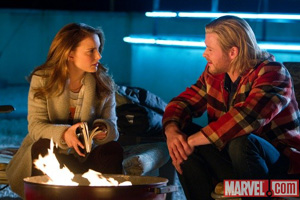 I particularly liked how Jane and Darcy react to Thor’s arrival. They aren’t immediately throwing themselves at him. They think he’s hot, but likely to be crazy. I know you’re a staunch feminist, so I imagine their portrayal was important to you. Can you talk about how you approached them? It seems rare to have two girls in a single Marvel film, possibly competing for Thor’s attention. How did that play into the romance, and how did you approach the relationship between Thor and Jane? Did Natalie Portman and Kat Dennings have any input into their characters?
I particularly liked how Jane and Darcy react to Thor’s arrival. They aren’t immediately throwing themselves at him. They think he’s hot, but likely to be crazy. I know you’re a staunch feminist, so I imagine their portrayal was important to you. Can you talk about how you approached them? It seems rare to have two girls in a single Marvel film, possibly competing for Thor’s attention. How did that play into the romance, and how did you approach the relationship between Thor and Jane? Did Natalie Portman and Kat Dennings have any input into their characters?
Kat did an amazing job taking the words on the page as written and making them fly. She really embodied the character of Darcy.
After the second trailer came out, I read some people mistakenly speculate that her character was created as a marketing decision to appeal to the youth audience or some such thing — as if the producers sat down and said, “Hmm… this script is good, but we need a character to appeal to the tweens! With current pop cultural references!” I promise you, that wasn’t the case at all. I came up with Darcy because we needed someone to work with Jane Foster, and the character had to have a vastly different background, personality, and world-view from Jane in order to make that relationship interesting. I decided to make her a woman, frankly, because other than Sif and Frigga, we had a very male-heavy cast of characters. I thought it might also be interesting to have someone working for Jane who both frustrated her and who Jane saw as protégé whose potential she could help fully realize.
But I also wanted Darcy to be the voice of the common man. We’ve got Asgardians and astrophysicists, so I wanted someone to say what the average moviegoer might be thinking. If someone in the audience is thinking, “What the hell is that weird, glowing thing?!” Darcy should be asking “What the hell is that weird, glowing thing?!” (That line isn’t actually in the movie, but you get the idea…)
Natalie actually helped out tremendously with the character of Jane Foster. Let’s be honest, Jane Foster in the comics has traditionally been one of the most boring characters in the Marvel Universe. In the film, she’s an astrophysicist, so that makes her more interesting right off the bat. And it doesn’t hurt that she’s played by Natalie, who brings loads of personality and charm to any character she portrays.
Originally in the script, however, Jane was more of a traditional scientist — a hardcore skeptic. But Natalie came to the first rehearsal with the idea of turning that on its end. She suggested making Jane the believer. She thought Jane could be more of a kind of “scientist as poet” — someone who thinks outside of the box, someone whose theories are considered outlandish and are frowned upon by the scientific community. But it’s the kind of thinking that leads to great discoveries. When Thor arrives, she’s willing to take a leap of faith — and she has to pay the consequences for it. Natalie’s input made the character more interesting, improved her relationship with Thor, and, in general, made the story better. And she helped make sure Jane Foster isn’t boring. So I’m grateful to her for that.
During my story meetings with Ken and Marvel, we put a lot of work into the Thor/Jane relationship, and there was much discussion about exactly how and how quickly things should progress between them. I think we succeeded in developing their romance realistically, so it doesn’t feel forced. 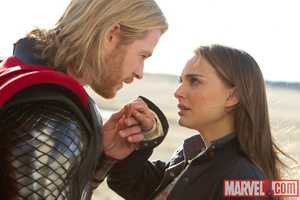
There were a lot of nasty rumors that came out from the set about squabbles between cast and crew members – we won’t name names, but I know a lot of people were quite hurt and upset. Would you like to take some time and squash those rumors for good?
They were all b.s. I know, because I was there. It made me furious when I read that stuff, because Chris and Tony and Ken are all such good, friendly people and such professionals. But the problem is, the more you deny false rumors, the more people believe them, because they think you’re just doing damage control. But, honestly, there was absolutely no conflict between Chris and Tony. And there was absolutely no tension between Ken and Tony, either. They obviously had an enormous amount of mutual respect and admiration. I swear, every day on set with those two guys was like a Shakespearean lovefest.
I was at Comic-con watching Marvel’s Thor, Captain America, and Avengers panels last year. I happened to be sitting near the Internet press. When Chris mentioned that he and Anthony got along great, I heard one of the bloggers behind me mutter, “Yeah, right…” It really annoyed me. People are so willing to believe the worst. It’s particularly frustrating, because the vibe on the set was one of the best I’ve ever experienced. Chris is not only a real movie star, he’s one of the nicest, hardest-working guys in the world. And Anthony Hopkins was everything you’d hoped he’d be — a professional, a gentleman, polite and congenial. I have to say, for a knight, he was amazingly down-to-earth, and he made everyone feel comfortable on the set. He was obviously having a great time from Day One. And it was a thrill to watch him work. I remember he did one particular take during the banishment scene which was so emotionally powerful, when Ken yelled cut, the cast and crew spontaneously burst into applause. 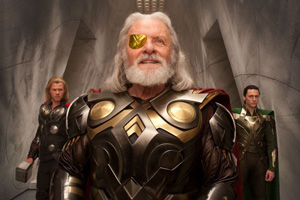
So it can be difficult when you see rumors about the set that you know for a fact are just vicious, gossipy lies. Of course, sometimes it’s just the little inaccuracies being reported out there that bug you, for some reason. For example, Stellan Skarsgard’s character has been mistakenly identified as both “Professor Andrews” and “Professor Andrew Ford.” I have no idea where those names came from. No character with either of those names has ever been in any draft of the script. The first time I saw it was on IMDB, and I’ve seen it mistakenly repeated on other sites — even in an interview with Stellan, which is odd. His character’s name is actually Erik Selvig. I’ve also seen Colm Feore’s character erroneously referred to as Ymir. He’s not Ymir. Wikipedia, take note!
There has also been a lot of ugly and foolish controversy about Idris Elba being cast as Heimdall. I don’t like to justify bigotry with attention, but has the reaction surprised you and the rest of the team?
You’d think as a society we’d be beyond this now. The funny thing is, this film was never meant to be a straight representation of traditional Norse mythology. It’s the cinematic take on the Marvel comics take on Norse mythology. In fact, in the reality of our movie, the Norse myths are actually based on our version of the Asgardians, after they visited ancient Norway. The Norse just got some things wrong, based on their primitive understanding of their encounters. (Like, for example, worshiping the Asgardians as gods.)
The bottom line is Idris is great in the movie. I think almost all of the people who are skeptical or have issues with the casting will be convinced when they see the movie — except for all the actual racists out there. But who needs them?
Can you tell me yet what lies ahead for the character? Will there be a Thor 2?
Right now everyone is focused on making Thor the best it can be. This film has to be great and has to deliver before people can seriously talk about moving ahead with a sequel. The same is true with every other Marvel property. But, you know, that’s always the hope. And if there is a Thor 2, I’ll definitely be involved.
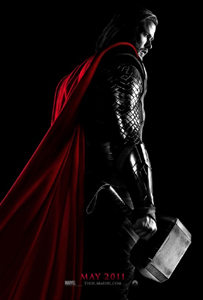 Can you tell me what other big projects you’re working on? Is there a dream superhero project or character you’d like to tackle?
Can you tell me what other big projects you’re working on? Is there a dream superhero project or character you’d like to tackle?
Honestly, I feel like I’m living the dream right now, bringing Thor to the big screen. Of course, there are many other Marvel superheroes near and dear to my heart, but other writers are already working on them, and they’re in very capable hands. I have to say, I’m looking forward to Captain America and The Avengers as much as anybody on the planet.
As far as what’s next for me, I’ve been on a leave-of-absence from The Simpsons since I’ve been working on Thor. I’m eager to start back. I love working there. It’s fun sitting around the table with that group of writers. They’re some of the funniest and most talented people I know.
I have other things lined up which I can’t talk about now. But ask me in a few months. I’m also ready to go on a much-needed vacation with my family, who I’ve been ignoring for far too long. It’s great to have worked on something that my kids are excited about. They’re at the age where they’re really into the comics and the animated series Avengers: Earth’s Mightiest Heroes. My oldest son wants to go as Thor next Halloween. My youngest son wants to go as Loki. Even my three-year-old daughter found a hammer the other day and went running around the house trying to smash things, saying she was “Tho-wah.” How can I be mad at her?